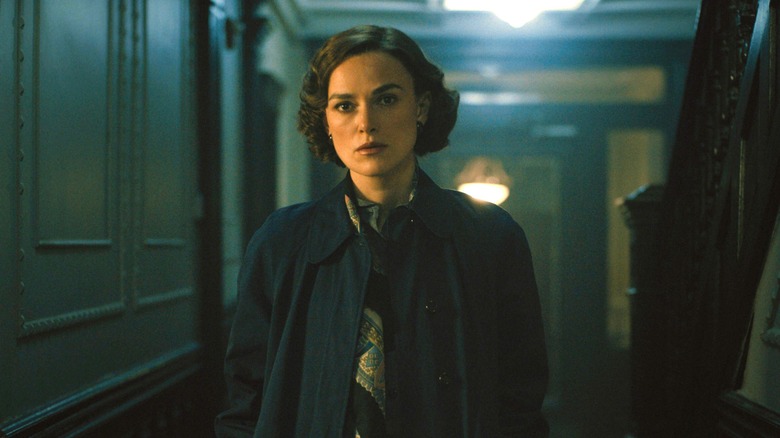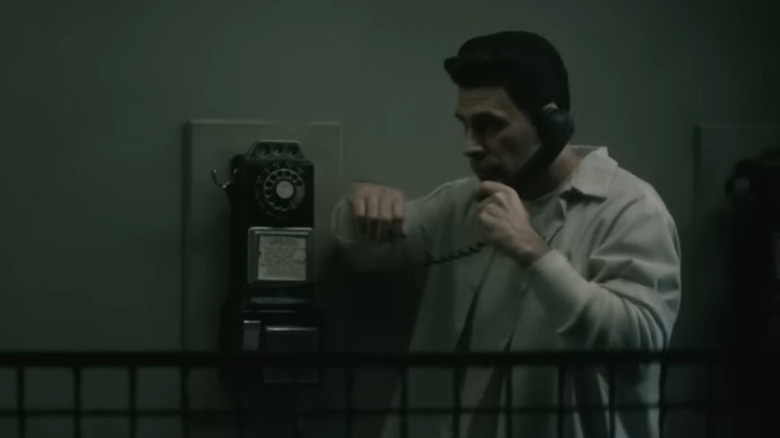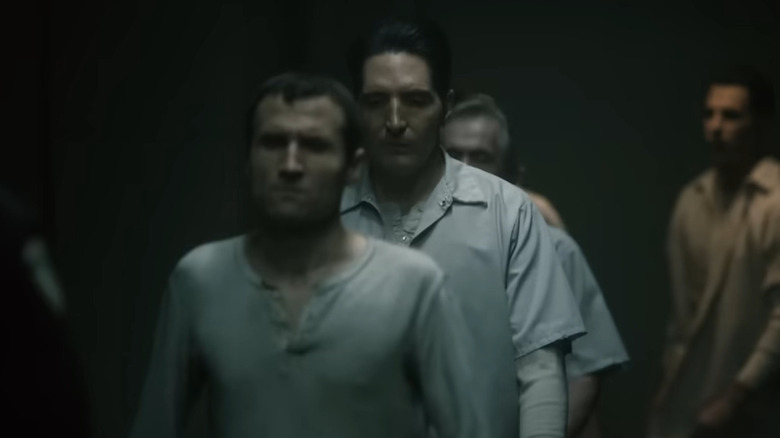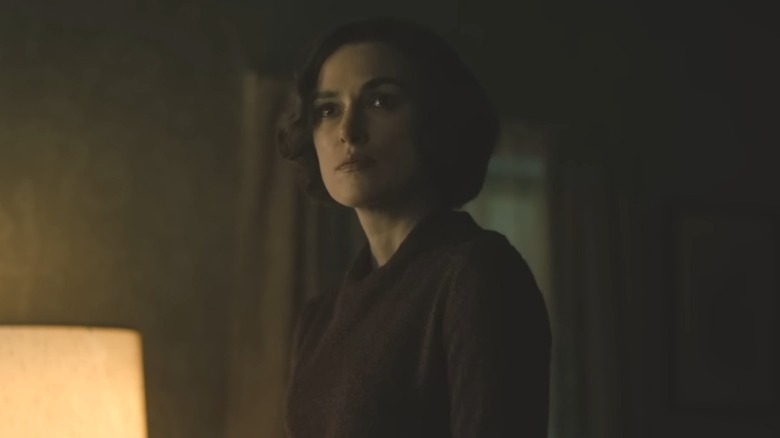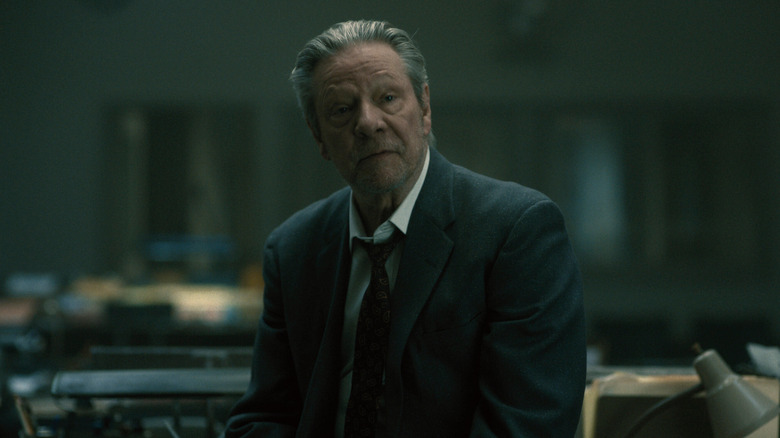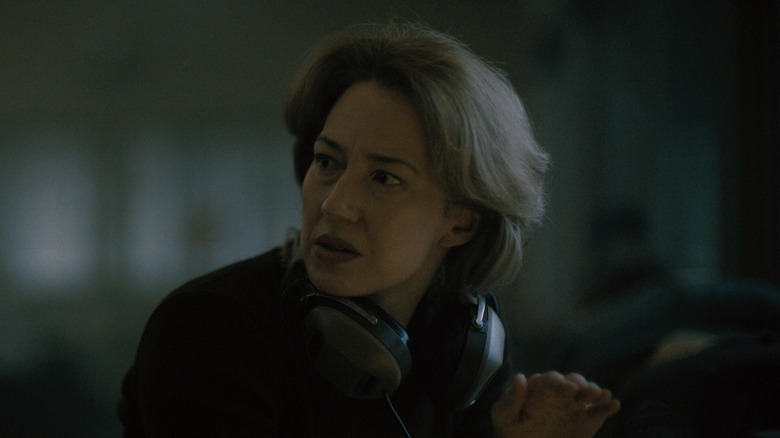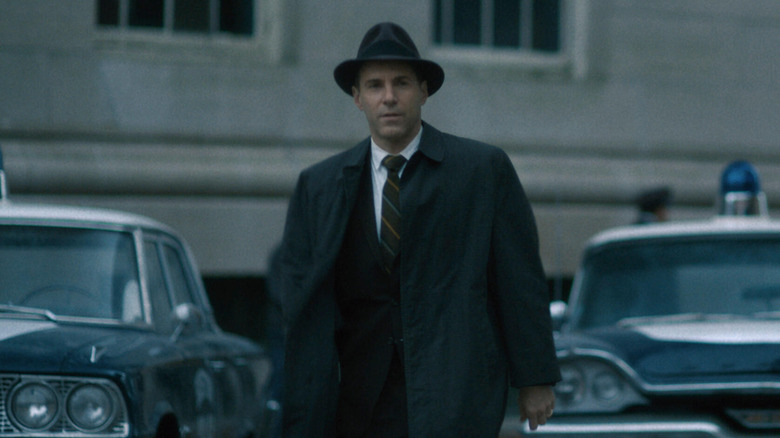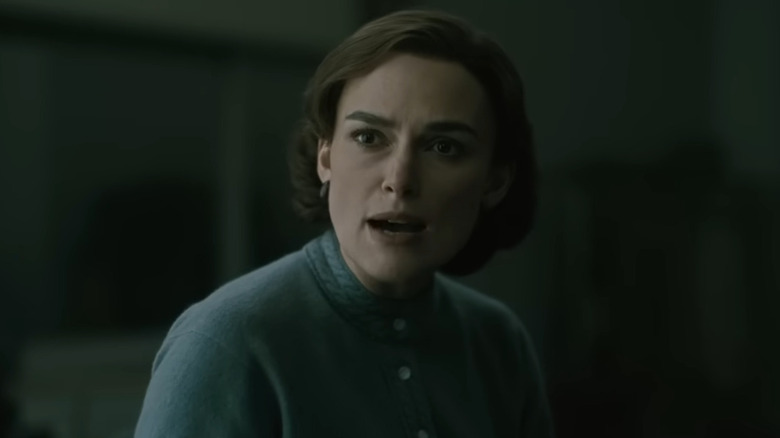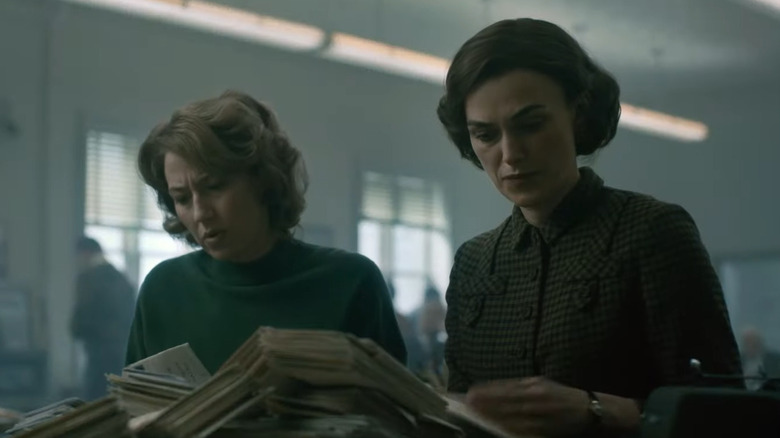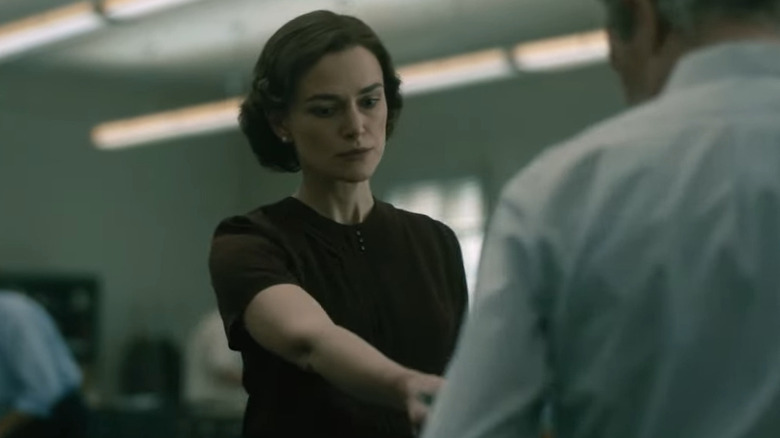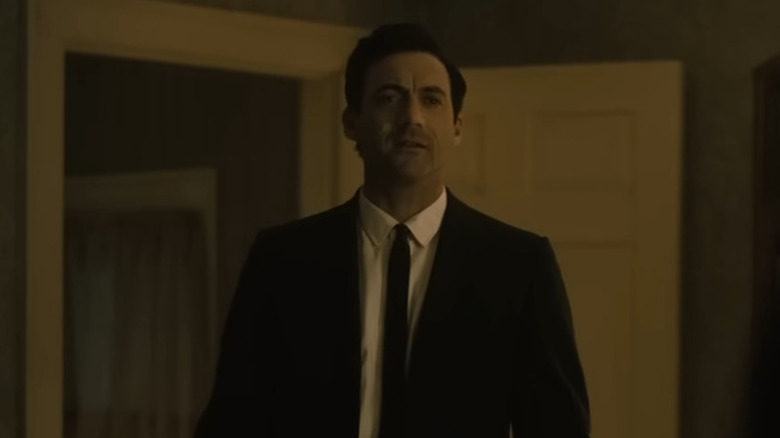The Ending Of Boston Strangler Explained
Can a lifestyle reporter solve one of the most notorious criminal cases in the Boston area, or should she stick to reviewing kitchen products? Hulu's new film "Boston Strangler" outlines the story of 13 murders thought to be the work of a serial killer, from journalist Loretta McLaughlin (Keira Knightley) making the initial connection between three seemingly random strangulations to one man trying to take credit for all the murders.
The movie takes audiences on a journey that explores sexism in the workplace, police cover-ups, and a mission to find the truth and save the women of Boston before it's too late. With the help of fellow reporter Jean Cole (Carrie Coon), Loretta dives into the world of crime reporting headfirst, approaching policemen at bars and tracking down inmate release records to support her theories. And the deeper she goes, the more dangers close in around her.
Just because the film is inspired by true events doesn't mean the ending is straightforward. Does Loretta solve the case? Is the perpetrator prosecuted? What actually happened to the real-life Boston Strangler? Grab a pen and paper and get ready to take notes as we share a spoiler-filled breakdown of the ending, with everything you need to know, explained.
What happens to Albert DeSalvo?
Albert DeSalvo (David Dastmalchian) is a prime suspect in the Boston Strangler case after Loretta's sleuthing. His previous criminal methods line up with how the Boston Strangler convinces women to let him into their homes and he's proven to have been in the area at the time of the murders. He seems to fit the picture of the perpetrator in everyone's eyes.
In a key scene, Loretta finds out DeSalvo had been fed information during his police interview, as revealed when he's unsure of the color of the victim's robe or the floor plan of the apartment. Needless to say, this casts doubt over whether DeSalvo could have committed the crime he's being questioned about. Shortly after he talks to Loretta on the phone, DeSalvo is killed by another inmate. It can be assumed by that this is to keep everything quiet, especially after Loretta speaks to George Nassar (Greg Vrotsos) and learns the truth behind DeSalvo's confessions.
An end card before the credits notes that decades later in 2013, DeSalvo was connected to the last Boston Strangler murder through DNA evidence. This does not link him to the other cases, which remain unsolved to this day.
Did George Nassar receive any money?
Part of George Nassar's plan in having DeSalvo confess to being the Boston Strangler is to claim the reward money. Nassar is identified by a victim in a lineup, but he's been serving time in prison and he couldn't have been responsible for all the murders. With Nassar's "help," DeSalvo "remembers" that he committed the murders and confesses. What's in it for Nassar if DeSalvo admits responsibility? Reward money to the tune of $10,000 per case solved. With 13 open cases, that's quite a bit of money for someone like Nassar.
But, does he ever receive any of it? The end of "Boston Strangler" shows that after Loretta publishes her story about Nassar's plan, all the cases are reopened, meaning they aren't solved, so there's no reward money to disperse. He doesn't receive anything despite all his work coaching DeSalvo. Nassar even brings in his lawyer F. Lee Bailey (Luke Kirby) to facilitate everything for him. It isn't surprising, considering reward money is typically for information that leads them to the actual perpetrator, not someone taking credit as a cash grab.
According to an end card, the result was the same in real life. Nassar remains in prison to this day, continuing to serve a life sentence for the murder of a gas station owner. He has appealed for a new trial multiple times.
What happens to Loretta's career?
As "Boston Strangler" comes to a close, audiences are left wondering what's next for Loretta, especially with the murders remaining unsolved. She's discovered key details about the case and earned herself quite the reputation. She's helped break the story in the local news, being the first to write about the connections between the cases despite the six male reporters covering crime for her paper.
She's given more and more leeway over the course of the movie. Her editor Jack MacLaine (Chris Cooper) trusts her instinct and lets her run with stories that are critical of the police investigation, calling out people that should be investigated in connection with the case. This does create some negative press and attention for her, but nothing she can't handle.
Despite her excellent work with the case, Loretta moves on to a different kind of reporting as her career continues and her life moves in a different direction. An end card tells viewers that she goes on to have a successful career as a medical reporter with the Boston Globe, winning awards for her work. It also notes she was one of the first journalists to cover the AIDS epidemic in the 1980s, making her a definite journalistic hero in the eyes of history.
Sexism in the workplace remains prevalent
Loretta isn't just handed a criminal case. At the start of the film, audiences watch as she pitches countless stories, trying to earn an assignment that doesn't involve reviewing a toaster or writing about the wives of men running for office. She's denied at every turn. It isn't until she asks to look into cases on her own time that her editor gives her the okay.
Even after her thorough work, her gender is used to discredit her work, especially when she starts taking swings at the Boston Police Department for their lack of progress in the case. People believe that she and Jean are writing about the case as part of some strange strategy by the paper. It's never considered that they get to write the follow-ups because they're good journalists.
"Boston Strangler" doesn't shy away from exploring the sexism women face in the workplace. Though the movie is set in the 1960s, the struggles Loretta runs into are prevalent today. Women still face the same assumptions about their work because of their sex, or are given different assignments than their male counterparts. In the 60 years since Loretta and Jean struggled to write more than puff pieces, journalism is still a male-dominated industry around the world. The movie is an excellent reminder that journalism — like so many industries — still has a long way to go when it comes to the gender dynamic in the workplace.
Zeroing in on the wrong suspect can come at a cost
After an off-the-record conversation, Loretta starts looking into Albert DeSalvo as a suspect. It's a roller coaster ride trying to figure out if he was in Boston at the time of the first murders and if he could have been capable of such acts, especially since he's known to have used the same tactics as the Boston Strangler.
When Loretta publishes a story with DeSalvo's name, she writes the end of his story. In Nassar's words, the journalist "created a myth." The report causes him to hire a big-name lawyer. With the public eye turned to DeSalvo, Nassar convinces him to confess to the murders for the reward money, while the lawyer secures DeSalvo a five-figure book deal to support his family. In putting his name out there early, she causes a chain of events she can't undo, and that leads to the end of his life. If the journalist hadn't published his name in the paper, things may have turned out differently for DeSalvo.
This situation is a great example of what still happens today. Once a name is attached to a case the public, and sometimes the authorities, run with it. Sometimes there's a hint of truth. In other instances, it creates a situation that grows and grows, ruining someone's life with false accusations. It's an important lesson in journalistic ethics and the importance of considering all sides of a case before pointing a finger.
Investigations don't always provide answers
In "Boston Strangler," zeroing in on Albert DeSalvo doesn't lead police anywhere. After they receive his "confession," DeSalvo's lawyer negotiates so it can't be used in court, making it almost impossible for him to be prosecuted for the murders even if he was responsible. Had Loretta not published her article naming DeSalvo, police may have had an opportunity to bring him in after a more thorough investigation. Perhaps they would've found more evidence that could be used to prosecute him.
After the compromised DeSalvo confession, the authorities still don't have any answers. They can't link anyone to the crimes and the citizens of Boston don't have closure. They're still forced to look over their shoulders, wondering if they're on the killer's radar or if they should keep their deadbolts set at all times.
This situation is an important reminder that, no matter who's investigating a case, sometimes the answer eludes everyone. The Boston Strangler isn't the only unsolved serial killer case in America's history, and there will be more as time goes on. Police departments can put everything they have into a case and still turn up empty-handed. It isn't ideal, but it's inevitable in many cases. Sometimes the authorities get lucky and new technology helps solve the case decades later, but that hasn't quite been the case for the Boston Strangler.
Criminal cases can make or break careers
In the field of criminal investigations, a single case can make or break someone's career. For Loretta, working on the Boston Strangler story propels her career to new heights that she may not have had access to otherwise as a woman in journalism. When audiences are introduced to her, she's working the lifestyle desk and is being assigned a toaster review to write.
Though reporting on the Boston Strangler sends some negative attention her way, it does ultimately help Loretta make a name for herself as a reporter. People become familiar with her work, with one detective even calling her because he read all her articles and considers her an expert on the topic. It helps move her career in a new direction, opening whole new doors for her.
This happens with police officers, district attorneys, lawyers, and anyone else involved in high-profile criminal cases. Their work typically puts them in the limelight, but it isn't always for the best reasons. If a prosecutor wins a big hearing, it will benefit their career and could result in them moving up the bureaucratic chain faster. If someone is found not guilty in a controversial case, their representation may be both blasted and lauded by the media. Either way, careers can advance in both directions depending on the outcome of a case, and Loretta's career moves in the best one.
The police aren't always responsible for solving a case
In today's world, it's becoming more and more evident that, when correctly utilized, entities outside of police departments can solve crimes before the authorities do. A prominent example is documented in the Netflix docuseries "Don't F*** with Cats: Hunting an Internet Killer." In this docuseries, several web sleuths document their journey of identifying Luka Magnotta in connection with videos of animal cruelty that surfaced online and the information they provided to police as Magnotta's actions escalated.
In "Boston Strangler," Loretta does the heavy lifting to link different murder cases together, especially after the Boston Police Department refuses to communicate and work with other police departments investigating similar murder cases. She's even contacted by these other departments because she's considered an expert on the case. While she isn't painstakingly analyzing videos like in the docuseries, she is running all over town, reading release records, and talking to policemen in bars, trying to connect the dots and the details. Her work is critical to uncovering what was really happening, even if the real killer (or killers) go undiscovered in the end.
The movie is yet another example of how individuals outside the police force can help in certain situations. While that isn't always the case, there are times when it can be effective. "Boston Strangler" may not be set in our modern world of social media clues, but it remains relevant in its exploration of what happens when crime collides with public perception.
Fresh eyes can help a case
Fresh eyes and new perspectives can prove invaluable in finding the truth. When Loretta looks into the first three murders, she spots connections that the police (and the crime reporters at her paper) have missed, showing that there may be a serial killer on the streets of Boston. Without her work, the police might never have even known what kind of crimes they were dealing with. She goes on to figure out that DeSalvo was released from jail early, a detail that went unnoticed by another detective that looked into him as a suspect, and a revelation that changes everything.
"Boston Strangler" shows why fresh eyes are necessary in most situations. It isn't because the first set aren't capable, but because everyone brings a unique perspective due to their own life and past, and that could be the reason something new is unearthed. Multiple perspectives can help discover new details and brainstorm new ideas. While the police officers in the movie make it out to be a bad thing that Loretta connects the cases and continues to conduct her own investigation, she simply uses her perspective as a woman in journalism to notice something the police hadn't yet.
Work can detrimentally impact home life
As Loretta comes to find out, professional success can put a strain on one's home life. Her husband James (Morgan Spector) has to do more with the kids as she takes off at all hours to follow up on leads and get to crime scenes first, and it starts to take a toll. When he's offered a new position that would require him to spend time in another city, it turns into an argument rather than a celebration that his work is being noticed and rewarded.
By the end of the movie, the two are clearly on different pages. While her husband always appears supportive of her career, it's evident that her inconsistent hours are doing more harm than good. As Loretta pulls up in front of her home after publishing her exposé on Nassar's plan, she decides to keep driving, showing that she believes something has come between them that can never be repaired. An end card notes that in real life, Loretta and James ultimately divorced.
Their story is something many can speak to. As someone's job shifts or their responsibilities at work grow, it can have a negative impact on the relationships in their life. In Loretta and James' case, it results in the end of the marriage. In particular, it's the change in her role within in a career that's uncommon for women that changes the dynamic between them.
